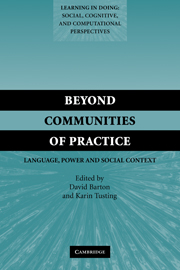Book contents
- Frontmatter
- Contents
- List of Contributors
- Series Foreword
- Introduction
- 1 Literacy, reification and the dynamics of social interaction
- 2 Language and power in communities of practice
- 3 Mediating allegations of racism in a multiethnic London school: what speech communities and communities of practice can tell us about discourse and power
- 4 “I've picked some up from a colleague”: language, sharing and communities of practice in an institutional setting
- 5 The person in the doing: negotiating the experience of self
- 6 Communities of practice and learning communities: do bilingual co-workers learn in community?
- 7 Moving beyond communities of practice in adult basic education
- 8 ‘Communities of practice’ in higher education: useful heuristic or educational model?
- 9 Communities of practice, risk and Sellafield
- 10 Semiotic social spaces and affinity spaces: from The Age of Mythology to today's schools
- Author Index
- Subject Index
- LEARNING IN DOING
- References
5 - The person in the doing: negotiating the experience of self
Published online by Cambridge University Press: 24 November 2009
- Frontmatter
- Contents
- List of Contributors
- Series Foreword
- Introduction
- 1 Literacy, reification and the dynamics of social interaction
- 2 Language and power in communities of practice
- 3 Mediating allegations of racism in a multiethnic London school: what speech communities and communities of practice can tell us about discourse and power
- 4 “I've picked some up from a colleague”: language, sharing and communities of practice in an institutional setting
- 5 The person in the doing: negotiating the experience of self
- 6 Communities of practice and learning communities: do bilingual co-workers learn in community?
- 7 Moving beyond communities of practice in adult basic education
- 8 ‘Communities of practice’ in higher education: useful heuristic or educational model?
- 9 Communities of practice, risk and Sellafield
- 10 Semiotic social spaces and affinity spaces: from The Age of Mythology to today's schools
- Author Index
- Subject Index
- LEARNING IN DOING
- References
Summary
If the world is held together by communicative acts and connected through communicative channels, to speak means to choose a particular way of entering the world and a particular way of sustaining relationships with those we come in contact with. It is then through language use that we, to a large extent, are members of a community of ideas and practices.
(Duranti 1997:46)INTRODUCTION
This chapter engages in a critical assessment of some of the concepts underlying the Communities of Practice approach to social life and suggests ways of complementing it with theories of language (Halliday 1993), discourse (Chouliaraki and Fairclough 2000) and with an approach to situated activity (Engeström, Miettinen and Punamäki 1999). To focus on the person in the doing from a language and discursive perspective implies that “participation in practice” is far from being a consensual and adaptative process of apprenticeship, but a conflicting and problematic process of negotiation of meanings, where mental, psychological, social and discursive aspects are revealed in the person's own process of making signs (Kress 1997). In particular, dynamics such as participation and reification are not merely located in communities of practice but are also language-based and situated in broader formations of practice and discourse, immersed in social, structural and historical orders (Barton et al. 2000).
The present chapter draws on ethnographic research into the routes through language and literacy practices experienced by a group of Portuguese women who have migrated to London.
- Type
- Chapter
- Information
- Beyond Communities of PracticeLanguage Power and Social Context, pp. 105 - 138Publisher: Cambridge University PressPrint publication year: 2005
References
- 8
- Cited by

